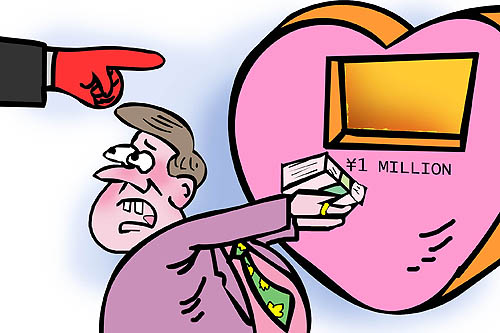|
 |
|
(LI SHIGONG) |
On June 21, at the inauguration of the Beijing Normal University One Foundation Philanthropy Research Institute, Wang Zhenyao, the institute's Dean and former Director of the Social Welfare and Charity Promotion Department of the Ministry of Civil Affairs, proposed it should be made mandatory for Chinese billionaires to donate at least 1 million yuan ($147,000) a year to charity.
He said his proposal was based on Bill Gates and Warren E. Buffett calling on wealthy people to devote half of their wealth to public welfare and charitable causes. The Chinese public point their fingers at the large number of Chinese billionaires who are rich but irresponsible and even disregard society.
Some people worry compulsory regulation is against the principle of making donations because of one's own free will while others complain the 1-million-yuan bottom line is too low. Wang's suggestion has ignited the topic of charitable donation among the Chinese public.
Inescapable responsibilities
Jiang Debin (www.china.com.cn): Billionaires' wealth comes from society and they are only temporary managers of the wealth. Ultimately, their wealth will be returned to society in various forms. It has long been a consensus billionaires, particularly entrepreneurs, should try to fulfill social responsibilities through tangible actions. The world's top rich such as Bill Gates and Warren E. Buffett donated more than half of their wealth to charitable causes. By comparison, a 1-million-yuan bottom line is not that great.
The 2010 Hurun Report on China's wealthiest people says the country now accommodates more than 55,000 billionaires. China's charitable donations reached a record high in 2008, with the total giving that year amounting to 107 billion yuan ($15.74 billion). If every billionaire donated 1 million yuan every year, the amount would top 55 billion yuan ($8.09 billion), almost half the 2008 total. If billionaires' donations become a regular practice, China's charitable causes will surely make great headway.
Of course, the progress of China's charitable causes can not depend on billionaires and millionaires. The whole of society's efforts are needed. Wealthy people, however, can set an example and play a leading role in promoting charity.
Wealth can be very powerful. The more wealth you possess, the bigger influence you have on society. At the same time, you should undertake more social responsibilities. Money is not the problem to China's wealthiest people. What they widely lack is a sense of being charitable and of social responsibility.
Tang Weiyi (Chongqing Morning Post): China now has 875,000 multi-millionaires, 55,000 of them are billionaires. These statistics show China's wealthy class is totally capable of charitable works.
But having enough money is not enough to promote one's interest in charity.
A yearly donation of 1 million yuan from every billionaire is a good suggestion. If this practice can be pushed forward among China's wealthiest people, China's charitable causes will develop soundly and rapidly. To make this a fixed system, the country needs to do more work in improving the charity environment.
Charitable causes must be made more transparent, with the support of explicit policies and systems, so billionaire donors know how their donations will be spent. Meanwhile, donations must bring honor. The government and the whole of society must show certain respect to billionaires who are actively involved in charitable causes.
Wang Zhishun (www.eastday.com): Setting a price tag for billionaires' annual donations to charity to fulfill their social responsibility is controversial. Opponents are likely to accuse these demands as "waging a war against the rich." China's billionaires should, however, seriously think about this suggestion against the social background of widening gap between the rich and the poor and some wealthy people's lack of enthusiasm about charity.
After Wang's proposition was reported, many people voiced opposition instead of support online out of concern the donations could be embezzled or pocketed by power-abusing officials or government departments.
This concern is somewhat justified and reflects harsh reality. We should separate encouraging the rich to contribute to charity from eliminating corruption. The rich cannot defer all charitable efforts until corruption is totally eliminated.
Chen Guangbiao, a successful businessman known as China's most generous philanthropist, has donated a total of 1.23 billion yuan ($180.88 million) to society, benefiting more than 600,000 people. During his involvement in philanthropic causes, Chen must also have been disappointed by problems that occurred in reality, but it has never stopped him from contributing. I guess that is because he gets joy from helping others.
| 